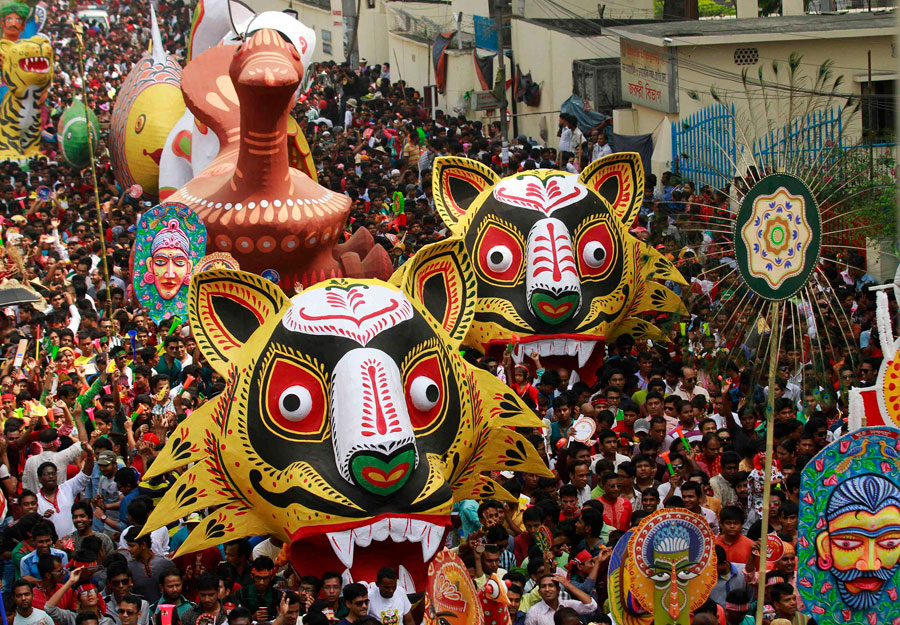 |
|
People carry masks and different animal floats down a street during celebrations on Pohela Boishakh, the first day of the Bengali new year, in Dhaka April 14, 2014. [Photo/Agencies] |
DHAKA - People from all walks of life in this capital city and elsewhere in the country celebrate the Bengali New Year, which falls on April 14, with a combination of traditional and modern practices.
Over the weekend, city residents have been swarming to shopping malls and marketplaces causing a huge traffic gridlock in major roads in the city.
"We've seen one of the biggest concentrations of shoppers this weekend as customers rush to shopping malls to buy new clothes and other items," Selim Reza, a salesman of Aarong, Bangladesh's leading fashion and lifestyle brand, told Xinhua Friday.
The city's fashion houses and boutiques were abuzz with shoppers who bought traditional dresses not only for their families but also for their relatives and friends, a traditional activity during the celebration of Pahela Baishakh or Bengali New Year.
"I've already purchased dresses for me and my relatives," said a shopper. "Now I would buy some pieces of jewelry to match my new dress." Most residents here are dressed in traditional costumes such as the shari and panjabi.
During the New Year, Bengalis usually start the day with the traditional simple breakfast of panta-bhat (leftover rice soaked in water) and fried hilsa fish.
Many were also seen busy buying cakes, sweets and fruits for the"to sweeten the mood" during the celebration.
Celebration of the Bengali New Year usually begins at sunrise when people wearing new dresses would gather in the main venues around the Dhaka University.
Like in previous years, thousands of people wearing masks and traditional dresses, mostly students of colleges and universities, are expected to join the colorful procession - the Mangal Shobha Jatra - to welcome the New Year with good spirits.
During the procession, students from the Dhaka University usually carry large symbolic figures of owl, tortoise, tiger and elephant all made of bamboo.
Before the procession, students from the university's Fine Arts Institute have already made figurines of rickshaws, oxen, dragons, crocodiles, flying birds, warriors on elephant's back, horses and tigers chasing evil spirits which they will use in the parade.
This year's procession is the 26th that the students of Dhaka University have coordinated to welcome the Bengali New Year.
In Bangladesh, Pohela Boishakh, or the first day of the New Year, is a national holiday.
Boishakhi Fairs are organized in many parts of Dhaka and elsewhere in the country. The lifestyle of rural Bengal is showcased in almost all these fairs which also stage traditional folk songs and plays.
Moguhal Emperor Akbar introduced the Bangla calendar year and the celebration of Pahela Baishakh, marking the advent of Bengali New Year, which is now considered as an integral part of the Bengali's cultural heritage and tradition.
The Mughal Dynasty ruled most of the Indian subcontinent for three centuries (1526-1707).
The Bengali New Year coincides with the mid-April New Year in Cambodia and a number of countries in the Indian subcontinent that include parts of India, Myanmar, Sri Lanka and Thailand.
|
|
|
|
|
|
|
|